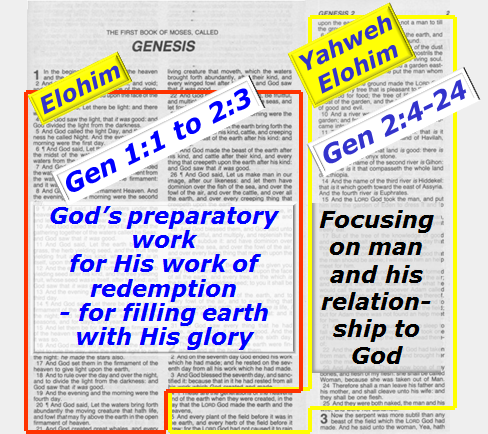Part 3
The account in chapter 1 (to ch 2:3) does appear to differ from the account given in ch 2 from verse 4 onwards. Yet do we have a problem with FOUR gospel accounts? No! We recognise that the gospels are presenting different aspects of the life of Jesus. Sometimes they appear to contradict, but patient study usually finds these are surface differences. Indeed it is a test of their veracity that the four gospel writers didn’t collude to avoid any “appearance” of variation in their stories.
So why should we be surprised at there being two apparent accounts in Genesis? Like the gospels it doesn’t take very deep study to appreciate that they are concerned with two different aspects. There is one marked difference between the two chapters. (For the purposes of this article, by chapter 1, I mean 1:1 to 2:3 – it is a shame the man-made chapter divisions were inserted too prematurely in this case). Ch 1 uses the name God – Elohim, Mighty Ones. Ch 2 uses LORD God, Yahweh Elohim, He who will be mighty ones. This latter is the title that God chooses to use to express His plan of salvation. This is not an incidental difference – it is fundamental to His revealed Word. Ch 2 is the beginning of the rest of the Bible message, God’s work of redemption. That work will eventually reach its climax when mortality will have ended and all who live will be immortal. The Kingdom Age is a stepping stone towards the ultimate Purpose of God. At the end of the Kingdom Age, when those who have lived and died during the Millennium will then have their time of judgement, then death will have been abolished for the human race, through the victory of the Son.
Then cometh the end, when he shall have delivered up the kingdom to God, even the Father; when he shall have put down all rule and all authority and power.
For he must reign, till he hath put all enemies under his feet.
The last enemy that shall be destroyed is death.
For he hath put all things under his feet. But when he saith all things are put under him, it is manifest that he is excepted, which did put all things under him.
And when all things shall be subdued unto him, then shall the Son also himself be subject unto him that put all things under him, that God may be all in all.1Cor. 15:24-28
That is the grand climax – how it is achieved occupies the rest of God’s Word! Whereas ch 2 focusses on man and his relationship with God, ch 1 focuses on the preparation work required. An earth equipped with everything that is necessary so that mankind can have a world to live in, where they can exercise their freedom of choice. To trust – believe – in God, or not. So the two accounts are dealing with different, yet interrelated matters.

